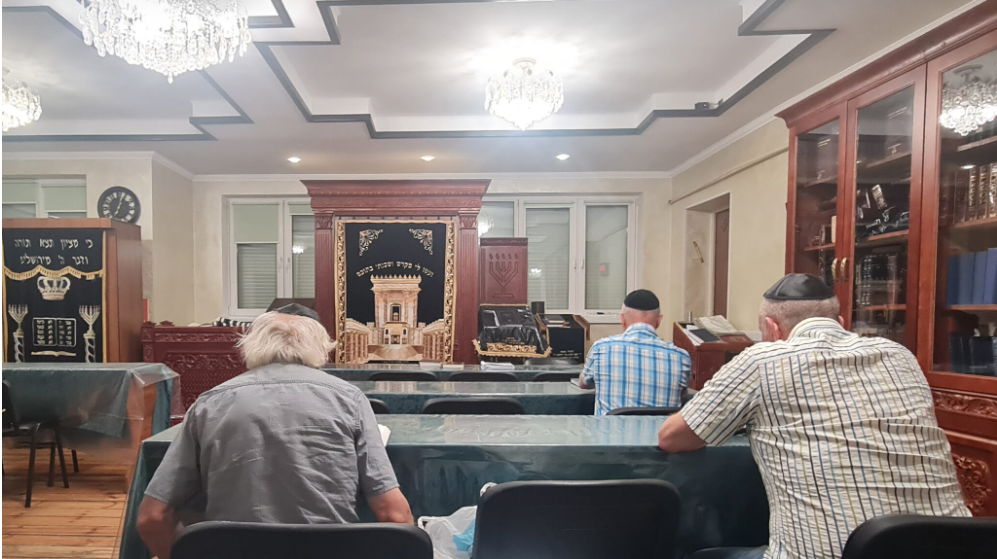At this city’s only regularly functioning synagogue, nine men and five women cheer a visitor on as he enters the building.
“Terrific! We have a 10th! Let’s begin!” one of the men, David Goldish, exclaimed during this interaction on a recent Shabbat.
5 View gallery
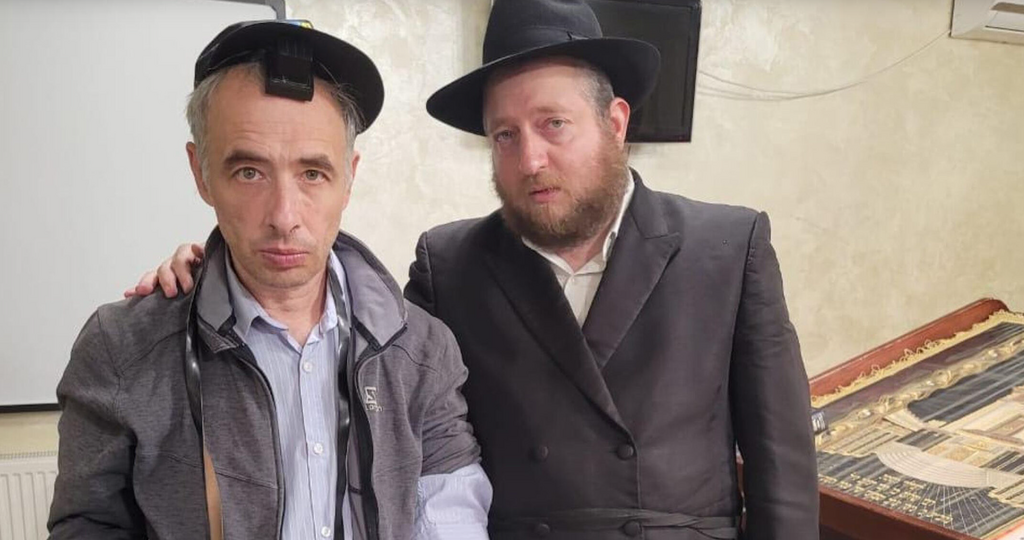

Rabbi Shaul Horowitz, right, meets a Jewish refugee attending service at the synagogue of Vinnytsia, Ukraine in June 2022
(Photo: Courtesy of Shaul Horowitz)
The struggle to gather 10 Jewish men to form a prayer quorum known as a minyan is part of life for many small Jewish communities in Europe.
But it used to be a distant memory in Vinnytsia, one of multiple Ukrainian cities where decades of community-building had restored Jewish communal life after communism. Dozens of Jews would gather for Shabbat services at each of the three synagogues of this city, which had about 3,000 Jews when war broke out.
Yet Russia’s invasion of Ukraine in February has compelled many thousands of Jews, and especially young Jewish families and singles, to join the millions of non-Jewish Ukrainians who have fled at-risk areas, and the country altogether.
By far the greatest threat to those who remain is from Russian attacks, which are unrelenting as the Russian army steps up its offensive. But already, local Jewish leaders in cities across Ukraine have begun to assess the toll on their communities’ strength — and are arriving at disquieting conclusions.
“It feels like we’ve gone back in time to 30 years ago because the pillars of the community have pretty much all gone out of Ukraine,” Rabbi Shaul Horowitz, the Chabad-Lubavitch movement’s emissary to Vinnytsia, told the Jewish Telegraphic Agency. “The wheel rolled back. We need to rebuild it all. Back to square one.”
Horowitz was referring to what happened in 1991, when the Soviet Union fell and Ukraine became independent. Jews from across the former Soviet Union who had been prevented from leaving fled out of the region — 1.6 million in total over more than a decade, mostly to Israel. Since Jewish education had been prohibited, few who remained had fluency in Jewish prayers or practice. But over the last three decades, a range of efforts, many fueled by Chabad, have introduced Ukrainian Jews to Judaism and built thriving communities in cities across the country.
Now, the conflict seems to have undone some of the revival enjoyed by Ukrainian Jewry, a minority whose prewar size was estimated to be at least 47,000.
In Vinnytsia, Horowitz estimated, half of local Jews are gone. His congregation gathers at a small synagogue that is accessible through a back alley that requires members to walk past a ramshackle car repair shop and apartment courtyards filled where chickens roam.
On a recent Friday evening, the congregants preferred to wait outside the synagogue in the fresh air to the alternative of staying inside the dark and poorly ventilated interior, filled with the smells of cooking cabbage, fried fish and cholent, the traditional bean and meat stew that many Jews consume on Shabbat.
The food, which is served with vodka after prayer and is a staple tradition in some synagogues in this part of the world, seemed to account for at least some of the event’s appeal for some elderly participants, who left immediately after consuming large portions of it.
“Most of the people who could leave — have already left,” said Mikhail Krilyuk, a 35-year-old single man who owns a local exporting business.
“Those who had money, a passport, an SUV to travel to the border, they packed up and left. That’s the kind of people who held this community together,” said Krilyuk, who decided to stay, in keeping with rules prohibiting men under 60 from leaving the country in case they are needed to fight.
The residents of Vinnytsia seemed to feel safe, ignoring the sirens blaring frequently last month.
“Oh, the alarms? Don’t worry about them,” one Vinnytsian, Oksana Politova, told a concerned reporter at one of Vinnytsia’s riverside cafés during one such incident. “It’s a national alert system so the rockets could be falling anywhere. And sometimes it’s just a false alarm.”
But on July 14, a Russian rocket did hit Vinnytsia – the second such incident during the war. It killed 23 people near an iconic statue of a fighter jet at the center of the city located about 100 miles southwest of Kyiv.
5 View gallery
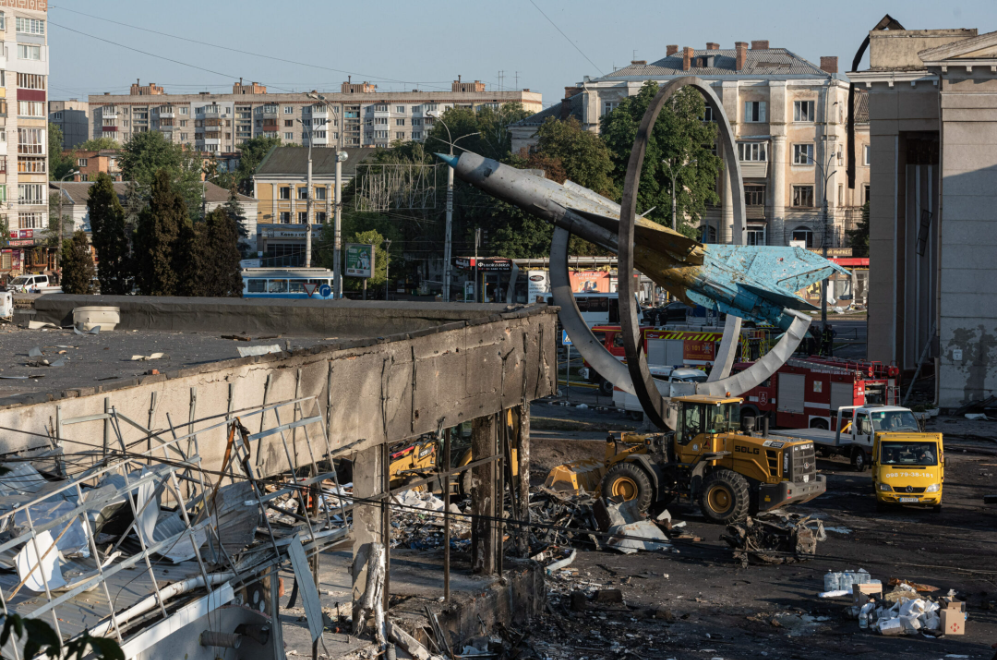

A heavily damaged office building and the monument to the military jet in Vinnytsia, Ukraine, after the Russian bombing there, July 14, 2022
(Photo: Getty Images)
“It just proves what I’ve been telling local Jews since war broke out: Nowhere in Ukraine is safe, they need to get out,” said Koen Carlier, a Belgian national who has been living for over a decade in Vinnytsia, where he and his wife Ira run the Ukraine office of Christians for Israel, a group that helps Jews immigrate to Israel.
Local Jews were not expecting the assault on a placid and relatively affluent city that doesn’t have any great strategic significance to Russia.
“Despite that attack, the Jews here largely stayed put. They have nowhere else to go,” Horowitz, 44, told JTA. “But it shocked all of us. It made the community panic.” None of the city’s Jews were hurt in the attack, but two, including the community’s driver, Simha Haim, were traumatized by it.
For the past decade, Horowitz has focused on gathering the region’s Jews into a community. Now he is encouraging and helping anyone from his flock who is able to leave the country to do so.
A frequent target of Russian attacks, Kyiv’s Jewish community is also seeing the war roll back much of the progress reached there since the fall of communism.
Before the war, the city had one of Eastern Europe’s few large non-Orthodox Jewish communities: the Hatikvah congregation, with about 500 families.
Fully half have left, according to Hatikvah’s rabbi, Alexander Dukhovny.
“Pensioners, people with disabilities — they are still here. But many of the young families with the possibility to leave have left to different destinations,” he said.
Dukhovny believes some will return. He saw some people who fled in the war’s early days at a recent Kabbalat Shabbat, a Friday night service, which his community had suspended due to Russian attacks and only recently resumed in a sign of return to normalcy that the congregation “celebrates with a lot of joy,” he said.
But many thousands likely won’t be returning – especially among the approximately 12,000 who had left for Israel under its Law of Return for Jews and their relatives in the first half of 2022 alone. (The figure for the whole of 2021 was 3,129.)
Ukrainian Jewry has flourished despite multiple crises, including the 2014 Russian annexation of Crimea, the 2005 Orange Revolution, and the political and financial instability it brought.
In addition to dozens of synagogues, mikvahs, Jewish schools and kindergartens that have all been opened in the past 30 years, Ukrainian Jewry boasts institutions so large and conspicuous that they have become symbols of its presumed robustness.
First and foremost among those flashy embassies for Jewish life in Ukraine is the Menorah complex in Dnipro, an eastern city that has been on the receiving end of multiple Russian assaults.
Built by the Chabad movement in the city where its last leader lived as a child, the $100 million Jewish community center includes event halls, a synagogue, spa-like mikvahs, several kosher restaurants and, until recently, local branches of Israeli banks for dual nationals.
It towers over the skyline of the city, which before the war had at least 10,000 Jews, with its 22 stories that comprise a giant menorah. It’s said to be the largest Jewish community center in Europe, all built with monies from Ukrainian-Jewish oligarchs, including Igor Kolomoisky.
5 View gallery
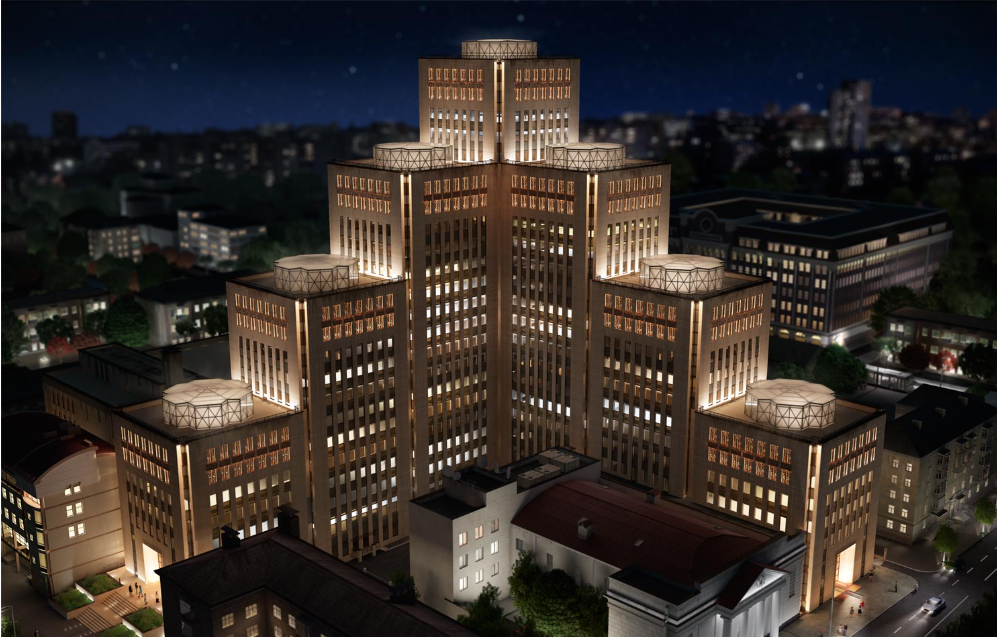

The Menorah Center in Dnipro, Ukraine, is said to be the largest Jewish community center in Europe
(Photo: Jewish Community of Dnipro)
Life hasn’t changed much at Menorah and for Dnipro Jews following the war, according to Oleg Rostovchev, a spokesperson for the Dnipro Jewish Community.
“Some have left but there are still thousands of Jews here,” he told JTA.
But a community member who spoke to the Jewish Telegraphic Agency anonymously, citing possible negative implications for giving out “non-official information,” as the source termed it, said that about half of Dnipro’s Jews have left. “Or maybe it just feels like that because the ones who live half in Israel and half here stopped coming,” the source said.
In Odesa, another major center of Ukrainian Jewry, at least half of the Jews have left, according to several locals. And in Kharkiv, another former hub of Judaism in Ukraine that has come under intense bombardment, hardly any remain at all, according to Moshe Moskovitz, the city’s Chabad rabbi.
In some places west of Kyiv, internal displacement of Jews is counteracting departures from the ranks of local Jewish communities.
Sergey Poliakov is one of the Jewish refugees staying in Vinnytsia. An employee of the Roshen chocolate factory from Kherson, he and his fiancée fled to Vinnytsia when their city came under Russian attack.
They are now staying at Vinnytsia’s only Jewish school – a mansion-sized Soviet-era building in the city’s outskirts whose new, modern-looking mikvah contrasts sharply with the building’s overall crumbling appearance.
The fact that it exists at all is remarkable, Horowitz noted.
“This city under communism had one synagogue that the authorities kept open for propaganda purposes. It was in the market and just to make sure nobody goes in, there was a KGB outpost overlooking the synagogue. Anyone who went in was documented,” Horowitz said. During the Soviet era, many Jews who demonstrated a desire to worship publicly or belong to a Jewish community were persecuted, often for engaging in Zionist activities, which were banned.
Some courageous local Jews entered anyway, sometimes using a secret entrance while pretending to shop, he said.
The seven families now living at the school compound, including some non-Jewish ones, all came from further east. They pick cherries and pears for kompot — a chilled fruit soup that is a staple summer food — from the many trees that dot the compound, and they planted potatoes in a former playground.
On a recent Saturday evening, a non-Jewish family playfully coaxed Poliakov to taste some chicken they had barbecued for a birthday party of one of the family’s members, a 44-year-old woman named Dora.
“It’s kosher as can be, I assure you!” said Dora, who was on her fourth shot of vodka. “Yes, I’m sure but I’ll stick to the booze,” Poliakov replied, smiling.
Poliakov, 33, said he doesn’t know whether his flat in Kherson, which he recently bought with his life savings, “is even still standing or whether it’s a heap of rubble,” he said. “All my neighbors also left so there’s no one to check. It’s a ghost town. I’m working under the assumption that I have nowhere to return.”
With that in mind, Poliakov, an observant Jew with a high-earning job, may well settle down in Vinnytsia, one of Ukraine’s richest cities with a population of 370,000 and infrastructure matched by few others of its size. Or he may make Aliyah, the term for immigrating to Israel, he said.
5 View gallery
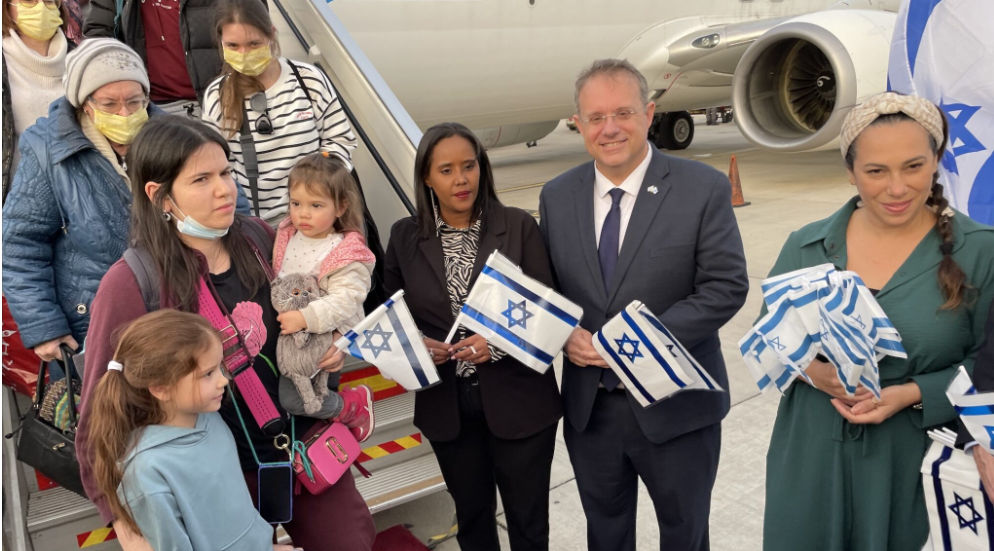

Israeli officials, including Aliyah and Integration Minister Pnina Tamano-Shata, center, greet refugees from Ukraine as they arrive at Israel’s Ben-Gurion Airport, March 6, 2022
(Photo: Getty Images)
Poliakov is among the people who are considered pillars of their communities who left because of the war. There are many like him, according to Eduard Dolinsky, the director of the Ukrainian Jewish Committee, one of several groups representing Ukrainian Jewry.
It’s too early to talk statistics amid the fog of war, Dolinsky said, but he estimates that war-related emigration is especially high among a category of Jews he considers “pillars of the community – people who go to synagogue every week and care about being Jewish,” he said.
For such Jews, years of community-building around Israel, Hebrew and Judaism may have helped build relationships outside of Ukraine, including in Israel, that facilitated fleeing in the hectic early weeks of the war, when many around the world sought to support Ukrainians.
But many of those who left were not actively engaged in Jewish life in Ukraine, according to Vyacheslav Likhachev, a spokesperson for the Vaad Ukrainian-Jewish group and a historian who has researched social issues relevant to Ukrainian Jewry.
“Most Ukrainian Jews are secular. Their attachment to the community, to the degree that it exists, is cultural or through receiving aid from the American Jewish Joint Distribution Committee, not through Chabad and the rabbis who engage with a small percent of the Jewish minority,” said Likhachev.
So why did so many Ukrainian Jews leave for Israel during the war?
“Because they could and because in Israel, almost all of them have friends or family,” Likhachev said, adding that because hundreds of thousands of people from Ukrainian territory made Aliyah in the 1990s, “Most of Ukrainian Jewry is already in Israel.”
How many of them remain is the issue of some disagreement.
Chabad says there were about 250,000 people who are Jewish according to halacha, traditional Jewish law, in Ukraine before the war with Russia. The European Jewish Congress, based on data from local Jewish groups, says up to 360,000. And the Institute for Jewish Policy Research in a 2020 demographics report estimated that there were about 47,000 people who self-identify as Jews that year in Ukraine.
Whatever the number, Ukraine’s small congregations are being hit especially hard by the effects of the war, Dolinsky said.
“In a synagogue where you had 50 people coming to synagogue every week, 10 have remained,” Dolinsky said.” It means the smaller communities will disappear.”
In Uzhgorod, a city on the border with Hungary, the war has led to an influx of Jews – people from further east who came to Uzhgorod for safety.
“The synagogue is busier than ever and so are we,” said Sarah Wilhelm, the wife of Rabbi Mendel Willhelm, the Chabad movement’s emissary to Uzhgorod, where a few hundred Jews live. But the war “has made everyone poorer and sadder,” she said.
Dolinsky is pessimistic that communities will ultimately be shored up by Jews who move there from elsewhere in Ukraine.
“The Jewish people who fled from the east to more western cities will not remain there. They are moving forward. They’re moving to a new life in Europe,” said Dolinsky, 52, who during the war moved from Kyiv to the western city of Lutsk. He and his wife Oksana now divide their time between those two cities.
He said the consequences of the war on Ukrainian Jewry will go far beyond demographics.
The ensuing financial crisis has ruined the local currency, the hryvnia, and much of the local economy. That means that oligarchs like Kolomoisky or Victor Pinchuk will likely have less money to invest in rebuilding Ukrainian Jewry, he said. Meanwhile, while Jews from around the world donated to support Soviet Jewry 30 years ago, collecting the money abroad could be difficult this time around amid what is shaping up to be a new global financial crisis, Dolinsky added.
“It’s much worse than anything we’ve seen,” Dolinsky said. “It’s absolutely a disaster unlike any other in my lifetime at least.”


